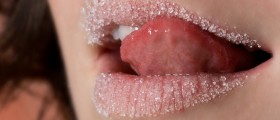
Alarming facts about sucralose
Sucralose is an artificial sweetener which is officially approved by the Federal Drug Administration after numerous studies on humans and animals were conducted. According to the results of these studies, the sweetener in question does not threat to endanger the human life, and it does not pose any risk for their reproductive or neurological health. Besides, this synthetic compound is not associated with any carcinogenic risks either. However, the truth is a bit different, and if one would take into consideration all the side effects reported so far, it is very likely that the person in question would give up on the idea to use this artificial sweetener. Another important piece of information, which is hard to believe but which is also true, is that every year, the number of those who choose to use sucralose increases for 10 %, but more than half of them suffers from either sucralose allergy or sucralose toxicity.
Even though sucralose is practically sugar, what makes it different is the fact that it also contains additionally added chlorine atoms. The additional ingredient can be found in a number of other products as well, but what actually makes the sweetener potentially harmful is the way in which it is created.
This artificial sweetener is known to be more than 500 times sweeter when compared to the sugar, and it is sweeter than saccharin, another artificial sweetener. This is one of the reasons why it is an inevitable ingredient of the beverages and products that should have longer shelf life.
Are there any side effects of sucralose?
Even though this food additive and artificial sweetener is recommended for pregnant women and diabetics, and even though people have begun to employ it in the process of weight loss, the truth is that there are some concerns regarding its use, and they simply cannot be overlooked due to their severity and frequency.
To start with, the person who uses it is very likely to experience gastrointestinal problems of which some might be very hard to tolerate. If a person takes in too much of it, problems with breathing should be expected, although even wheezing and tingling in the lips, tongue and hands have been reported in a number of cases. It can also provoke irritations of skin, rashes, swelling and other similar symptoms, which is why those who have sensitive skin are highly advised to avoid it. Psychological issues such as anxiety and changes of mood are also possible due to its regular use, as well as depression, and this is certainly only a part of the list.

















Your thoughts on this
Loading...